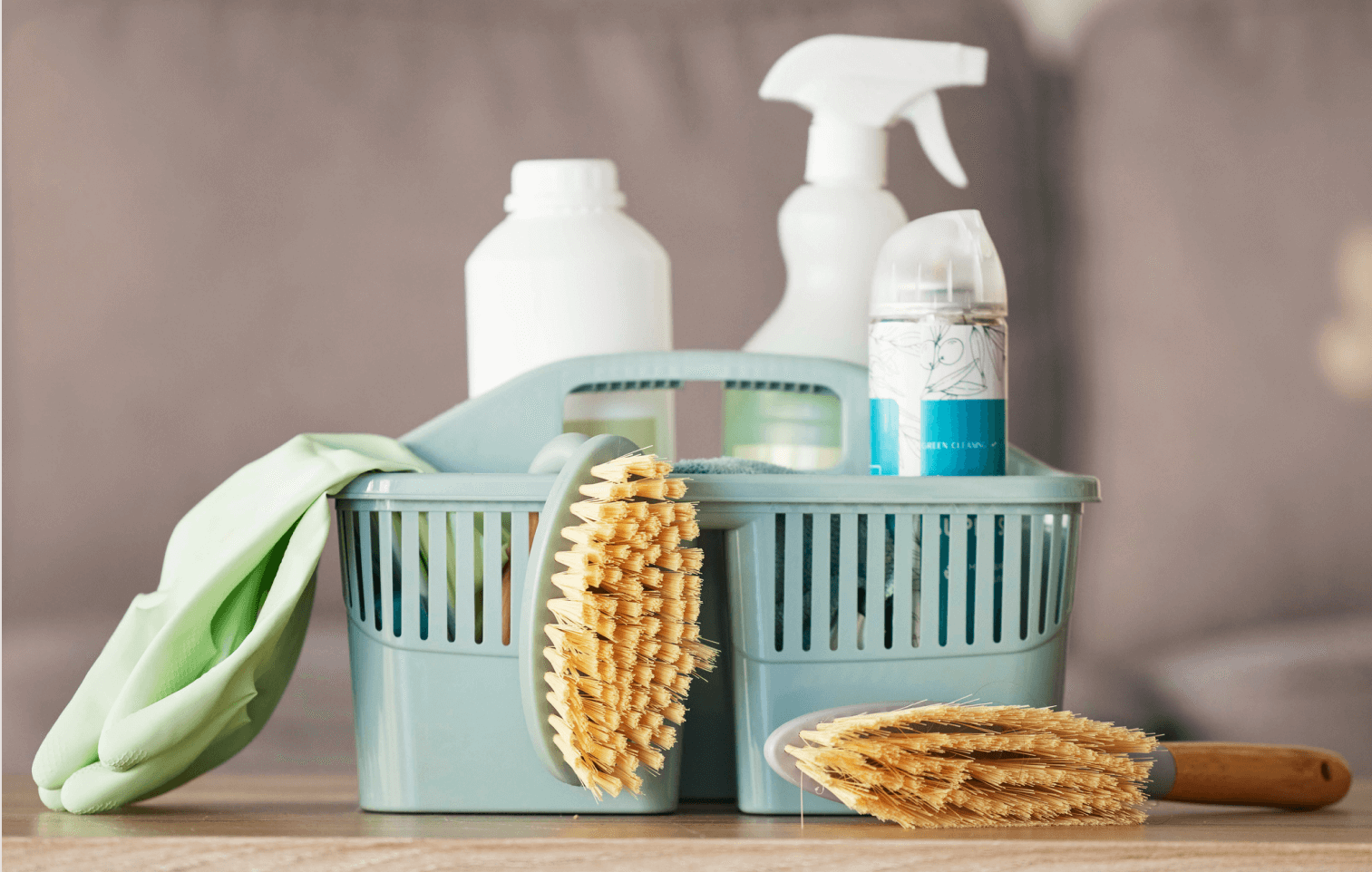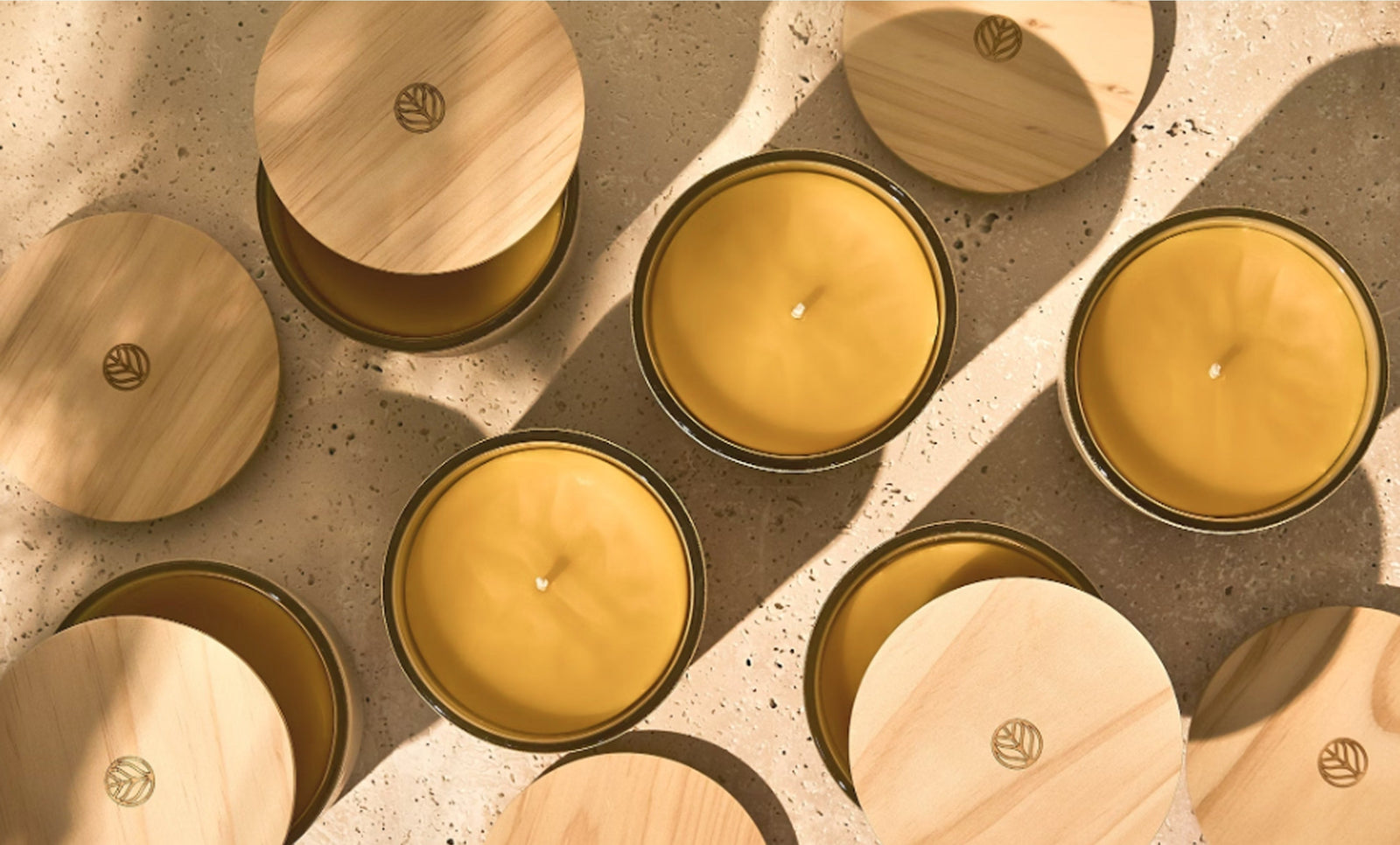Ethanol in Cleaning Products: Why You Should Avoid It

Ethanol is a common ingredient in synthetic and some green cleaning products, but is it safe?
Although ethanol is made from corn and sugar cane and could, therefore, be considered “natural” or “plant-based,” it still comes with various risks.
Plus, it’s entirely unnecessary for safe and effective household cleaning.
Here, we break down why we recommend avoiding ethanol in cleaning products and what to use instead.
What Is Ethanol?
Ethanol, also known as alcohol, ethyl alcohol, grain alcohol, is an alcohol derived from fermented corn or sugarcane.
It is used as a preservative, antibacterial agent, and solvent in cleaning and personal care products as well as in food, paints, gasoline, drugs, and household products.
Ethanol used in cleaning products is denatured, meaning it’s been changed to have a very bitter flavor, making it unfit and undesirable for human consumption.
Ethanol is popular in cleaning products because:
- It’s cheap and widely available
- It’s effective at degreasing, dusting, and general cleaning
- It evaporates quickly
- It’s an effective preservative
- It helps ingredients mix together in formulas
While there’s no denying ethanol has merit as a cleaning agent, it also has a dark side and can be very harmful to humans, pets, and the environment.
Why Should I Avoid Ethanol in Cleaning Products?
So, what’s so bad about grain alcohol anyway?
Let’s start with the potential health problems associated with ethanol exposure.
Firstly, ethanol is a VOC (volatile organic compound), which can cause various ill health effects such as respiratory problems, sick-building syndrome, headaches, nausea, brain fog, and others when inhaled.[1] [2]
Similar adverse events have also been reported from the topical use of hand sanitizers.[3]
This is why ethanol-based cleaning products are not recommended for those with asthma, allergies, chronic respiratory conditions, or chemical sensitivities.
As we’ve written about extensively in other articles, VOCs from harmful ingredients should be avoided or minimized whenever possible.
Topical use of ethanol is also potentially problematic, especially if it’s used frequently, as any amount of alcohol can tax or even damage the liver.
Ethanol is also highly flammable, making it risky for household use, especially in the kitchen or laundry room.
Finally, although ethanol has been promoted as a more environmentally friendly alcohol than its petroleum-based cousin, isopropyl alcohol, the truth is ethanol is an environmental disaster.
Government subsidies on corn, for example, have incentivized the destruction of forests and other natural habitats to make way for millions of acres of corn.
This practice not only destroys precious existing ecosystems, but installs a monoculture crop that requires copious amounts of pesticides, synthetic fertilizers, herbicides, fungicides, and genetically-modified seed just to survive.
Monoculture practices like this degrade soil health, pollute waterways, kill beneficial insects like pollinators, release toxic pollutants into the air, and rob farmers of their right to save and collect seed.
As documented in films like Kiss The Ground, this type of industrial, chemical-based agriculture is a leading culprit in the climate challenges we see today.
So, while it’s true that ethanol is not a petroleum product, the way it’s made is not in the least bit environmentally friendly.
Related reading: What Are VOCs? The Dangers + What You Need To Know
What Does Ethanol Do In Cleaning Products?
As mentioned previously, ethanol is used as a preservative, degreaser, antibacterial, and a solvent in cleaning products.
It may be found in synthetic and green cleaning products, so be sure to check labels.
Common Household Products That Contain Ethanol
Ethanol is a common ingredient in most synthetic chemical cleaners. It’s also found in other household products, including:
- All-purpose cleaners
- Air fresheners
- Bathroom cleaners
- Antibacterial/disinfectant cleaners
- Hand sanitizers
- Skincare products
- Hair care products
- Paint
- Art supplies
- Mold and mildew removers
- Wipes
- Baby products
- Window and glass cleaners
- Oven cleaners
- Carpet cleaners
- Stain removers
- Laundry products
- Mouthwash
- Cough syrups
- Foods
- Alcoholic beverages
Because ethanol is considered a plant-based product (it comes from corn), it may be used in various “green”, “organic”, “plant-based”, “all-natural”, and “chemical-free” cleaning products.
See the following articles for more tips:
- Are They Greenwashing? How To Decipher A Brand's Sustainability Claims
- What Does Chemical Free Really Mean?
Ethanol Alternatives
As you’ve just learned, ethanol is an effective degreaser, dust remover, preservative, antibacterial agent, and overall cleaner.
Fortunately, there are many truly sustainable and human-safe ethanol alternatives for home cleaning, including:
-
3% hydrogen peroxide for disinfecting, windows and glass, drain cleaning, degreasing, mold and mildew removal, and more
-
Microfiber cloths for trapping and removing dust on electronics and surfaces
-
Branch Basics Streak-Free for windows, electronics, glass, and stainless steel
-
Branch Basics All-Purpose for everyday cleaning of surfaces, stain removal, carpet stains, produce cleaning, and more
-
Vinegar or lemon juice for just about everything including surfaces, degreasing, stain removal, fabric softening, descaling, soap scum, small appliances, rust, and more
-
Baking soda as a mild abrasive, stain remover, degreaser, tile grout cleaner, and bleach alternative
-
Dry steam cleaning to naturally disinfect
- Inexpensive vodka for disinfecting, deodorizing, windows, and more
- Natural soap, such as Branch Basics Foaming Wash, Gel Hand Soap, or liquid castile soap for removing germs on hands
Click the links above to learn more, and see 7 Effective And Natural Alternatives To Lysol for more on natural disinfectants.
Healthier Homes With Branch Basics
If you’re looking for an ethanol-free, human-safe, and truly environmentally friendly cleaning line, Branch Basics meets and exceeds this criteria.
Our all-in-one plant- and mineral-based cleaning system contains no harmful synthetic chemicals, preservatives, VOCs, flammable ingredients, or harsh disinfectants.
It’s also MADE SAFE and Leaping Bunny Certified (cruelty-free) and is appropriate for use around babies, children, pets, people with asthma, or those with chemical sensitivities.
Branch Basics Concentrate, our core product, is designed to replace every single cleaning and laundry product in your home!
Just add the designated amount of water to the specialized All-Purpose, Streak-Free, Bathroom, Foaming Wash, and Laundry Bottles, shake and you’re ready to clean.
We also offer plastic-free Dishwasher Tablets, Laundry Detergent, Wool Dryer Balls, Gel Hand Soap, Oxygen Boost (included with Premium Starter Kits), and more.
Explore Branch Basics Starter Kits, available in reusable plastic or glass, and start creating a healthier, ethanol-free home today.
Frequently Asked Questions
Still have questions about ethanol in cleaning products? Check out these FAQs.
What’s the Difference Between Ethanol and Alcohol?
Ethanol is a type of alcohol from corn or sugarcane (in the United States, it comes from corn).
Alcohol can be made by fermenting various fruits, vegetables, and plants, such as grapes, potatoes, and sugarcane.
What Can I Use Instead of Ethanol for Cleaning?
If you’re used to disinfecting with ethanol-based cleaning products, low-tox alternatives include hydrogen peroxide, dry steam cleaning, and Branch Basics' natural disinfecting method.
For hand sanitizing, we recommend using a natural soap to remove germs rather than kill them. (Of course, if you need to clean your hands and all you have is alcohol-based hand sanitizer, that’s better than nothing. Just don’t make a habit of it!)
See the previous section on ethanol alternatives for more information.
What Is Denatured Ethanol?
As discussed previously, denatured ethanol has been modified to taste very bitter, making it unfit for human consumption.
Denatured ethanol or alcohol is used to deter people from consuming ethanol-based cleaning, sanitizing, or personal care products.
References Mentioned In This Article:
Categories

Marilee Nelson
Marilee Nelson is an Environmental Toxins expert who has spent nearly 30 years advocating for the chemically-sensitive and chronically-ill. She is a Board Certified Nutritionist, Certified Bau-Biologist and Bau-Biology Inspector and specializes in Food As Medicine. She has helped thousands of families and individuals identify, heal and recover from toxic exposures and is on a mission to revolutionize the way American families view their health.








